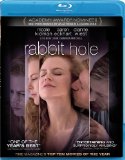| Reviews & Columns |
|
Reviews DVD TV on DVD Blu-ray 4K UHD International DVDs In Theaters Reviews by Studio Video Games Features Collector Series DVDs Easter Egg Database Interviews DVD Talk Radio Feature Articles Columns Anime Talk DVD Savant Horror DVDs The M.O.D. Squad Art House HD Talk Silent DVD
|
DVD Talk Forum |
|
|
| Resources |
|
DVD Price Search Customer Service #'s RCE Info Links |
|
Columns
|
|
|
Rabbit Hole
Lionsgate Home Entertainment // PG-13 // April 19, 2011
List Price: $39.99 [Buy now and save at Amazon]
The Film:
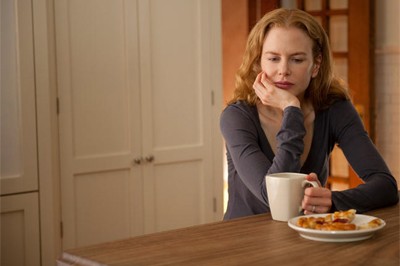 The Corbetts' life changed in a split-second. Factor after factor aligned at the wrong place and time, and a car accident claimed the life of their young son. Rabbit Hole doesn't focus on how Becca (Nicole Kidman) and Howie (Aaron Eckhart) handle the event as it happens, but roughly half a year after the event's taken place, with the two trying to get their lives back to a semblance of normalcy. It's a tough path filled with group therapy, stunted attempts at rekindling their passion, and the dark cloud that hovers over conversations they have with familiar faces, and there's no guarantee that they're going to make it through the gauntlet of anguish still hand-in-hand. John Cameron Mitchell's film, based off David Lindsay-Abaire's Pulitzer-winning play, focuses on how the couple's lives do eventually refocus towards coping and acceptance, understanding that things are the way they are and that life moves forward, for better or worse.
The Corbetts' life changed in a split-second. Factor after factor aligned at the wrong place and time, and a car accident claimed the life of their young son. Rabbit Hole doesn't focus on how Becca (Nicole Kidman) and Howie (Aaron Eckhart) handle the event as it happens, but roughly half a year after the event's taken place, with the two trying to get their lives back to a semblance of normalcy. It's a tough path filled with group therapy, stunted attempts at rekindling their passion, and the dark cloud that hovers over conversations they have with familiar faces, and there's no guarantee that they're going to make it through the gauntlet of anguish still hand-in-hand. John Cameron Mitchell's film, based off David Lindsay-Abaire's Pulitzer-winning play, focuses on how the couple's lives do eventually refocus towards coping and acceptance, understanding that things are the way they are and that life moves forward, for better or worse.
Rabbit Hole tests the threshold separating drama and melodrama, zeroing in on a topic that sounds like it should come equipped with a box of tissues with each ticket sold, but it does so by relishing in the expressive peaks that exist in both spectrums. It confronts the intense contemplations that surround situations like Becca and Howie's, such as the idea of a God that would claim the life of their child and both the necessity and futility of keeping mementos of him scattered about their house. Through the dual perspectives -- Howie's urge to cross the hurdle back towards lovemaking and socializing while retaining the memory of his boy, while Becca looms in a stagnant state that suggests it's wrong of her to move forward -- the story intuitively weaves through the subtle differences that hallmark each side of the conversation, and how the two collide in both cathartic and vain emotional moments.
Nicole Kidman and Aaron Eckhart deliver a two-punch of powerful performances here as Becca and Howie, concocting a chemistry between them that both validates the pull the characters have to one another and heightens their abrasive energy in the midst of their heartrending arguments. Kidman discovers a haunting, delicate fervor as the grieving mother, allowing her eyes and body language to often communicate louder than her words -- and to say completely different things than the words coming out of her mouth. Aaron Eckhart maintains the same level of potency in a more straightforward and readable performance that fits his character, yet never lacks in emotional complexity. When the two stand in the same room, whether over moody romantic music or following a fierce argument, the swell of emotion engulfs those watching in a rush of emotion that can assuredly be felt.
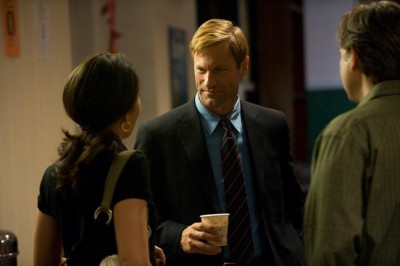 Cinematographer Frank G. DeMarco captures movement through their lives with textured warmth and buoyant coldness, intuitively tracing the contours of their faces to capture both weighted grief and burgeoning contentment. The visual tone, along with a perceptive editorial eye, doesn't attempt to wall off dramatic force; in scenes where Becca spitefully barks at her mother (excellently played by Dianne Wiest) over the phone amid a theological argument or when she irrationally explodes at her pregnant sister's (Tammy Blanchard) birthday party about baby gifts, the lucid photography captures every poignant nuance in all the characters' mannerisms. The drama is allowed to swell and collapse effortlessly with the gravity of the scenes, matching levelheaded movement during arguments with steady, artful focuses on the mundane -- caramelized sugar on cr�me br�l�e, Becca working in her garden, and a pair of unidentified skilled hands drawing with markers and cutting paper.
Cinematographer Frank G. DeMarco captures movement through their lives with textured warmth and buoyant coldness, intuitively tracing the contours of their faces to capture both weighted grief and burgeoning contentment. The visual tone, along with a perceptive editorial eye, doesn't attempt to wall off dramatic force; in scenes where Becca spitefully barks at her mother (excellently played by Dianne Wiest) over the phone amid a theological argument or when she irrationally explodes at her pregnant sister's (Tammy Blanchard) birthday party about baby gifts, the lucid photography captures every poignant nuance in all the characters' mannerisms. The drama is allowed to swell and collapse effortlessly with the gravity of the scenes, matching levelheaded movement during arguments with steady, artful focuses on the mundane -- caramelized sugar on cr�me br�l�e, Becca working in her garden, and a pair of unidentified skilled hands drawing with markers and cutting paper.
The key to Rabbit Hole's success -- and it certainly achieves it -- comes in its accessibility and discernment in when to holster this dramatic firepower, how John Cameron Mitchell paints this portrait of grief and growth without overtly pressing buttons or drudging through oppressive thickness. David Lindsay-Abaire's writing sketches broadly-shaded characters out of Becca and Howie, allowing each to grasp specific grieving personalities while also giving them organic character-defying moments, which Mitchell then frames within intimate, self-aware scenes that emphasize the feeble balance they've stricken in their lives. The film knows when to stress a twinge of pain in something as simple as Becca preparing a meal, while also knowing when to cool heads during fuming, gut-wrenching sequences of emotional warfare. Yet it also has a delicate eye for when to ease tension with authentic, albeit melancholy humor, especially with Howie's extroverted coping mechanisms -- and his budding connection with therapy cohort Gaby (Sandra Oh).
Oddly, it's Becca's coping mechanism that becomes the most fascinating thing about Rabbit Hole. On a lark, she begins to develop a somewhat awkward kinship with Jason (Miles Teller), the teenage boy who was driving the car the day that the life-altering accident occurred. Instead of lashing out at him like she does with everyone else, Becca begins to expose the raw wounds she's been harboring through their conversations, in which they timidly talk to one another about the accident and eventually, of all things, the basic science of alternate universes. What results from John Cameron Mitchell's picture can best be described as an eloquent, poignant progression that takes an involving glimpse at the process of coming to grips with death, one that's not afraid to lightly touch on the afterlife, the soothing possibility of other realities where we're happy and void of tragedy, and the happenstance that both dismantles and reassembles our lives.
The Blu-ray:
Video and Audio:
Rabbit Hole, shot digitally via the Red One camera system in high-definition, arrives from Lionsgate in a 1.78:1 1080p AVC encode that's damn near flawless. The positive merits of this Blu-ray disc could go on and on, from the precision in the concentration on fabric and rich skin textures to the sublime use of color in wood grains set design, and it handles fluctuations and minute details with a thorough eye for razor-sharp acuity. Contrast appropriately leaves detail visible in darker quadrants of the screen and within clothing and shadows, such as against Howie's dark polo shirt in the gym and in the darker parts of the skee-ball arcade, while the gradient shifts in lighter sequences -- the crisping creme brulee, the sheen on the floor in the bowling alley, and the gentle differentiation of marker strokes and pencil sketches -- contrast against one another with nary an instance of egregious bleeding or macro issues. If anything, there's a mild amount of smoothness that occurs due to the style of camera used, but you're really in for a treat with Lionsgate's presentation of Frank G. DeMarco's cinematography. It's beautiful.
The English DTS HD Master Audio track doesn't strike quite the same impressive chord as the visual transfer, but the sublime acoustic music and vocal delivery still shines. A few instances of surround activity stretch the design's legs out a bit, such as the chatter and pin-falling at a bowling alley, but mostly the rear channels are responsible for keeping the music as enveloping as possible. Verbal clarity hits a broad, fluid range of highs and low that depend on the vocals, with Eckhart's lower-toned voice hitting the bass depths and Dianne Wiest's higher-pitched voice stirring in the higher quadrant with robust clarity. The barking of a dog at a distance and the clank of skee-balls show discernment with spatial awareness, while the monotonous sounds of Becca working in the kitchen hold a well-balanced rhythm of ambiance. It's in the music, as previously stated, that the track really stands out, with piano notes ringing true amid silence and the incorporation of slight bass and strings slipping in with velvety poise. Both English and English SDH texts can be found alongside the Spanish language options under the subtitle menu, while a French 5.1 Dolby Digital track can also be paired with the film.
Special Features:
Filmmaker Commentary:
Director John Cameron Mitchell, writer David Lindsay-Abaire, and cinematographer Frank G. DeMarco gather together for this audio track, which follows an enriching and relaxed rhythm. They discuss the origin of the script, the reliance on Kidman and Eckhart's talent to create their chemistry under a very small amount of available rehearsal time, the updating of Howie's video from a VHS tape to the phone format, . Thay talk about Becca's maternal side and whether losing her child caused her to uptick her domestic exertion, the addition of scenes that weren't in the play, how Kidman signed onto the play, and the thought behind creating the artwork featured in the film (and the graphic artist who "got into character" while creating it). It's very low-key but offers a few unique shots of interesting content that keeps it upbeat, coasting all the way through the earnest, heartfelt back-slapping at the end.
Alongside the commentary, a trio of rather strong (but ultimately inessential) Deleted Scenes (3:07, HD AVC), and a terrific Theatrical Trailer (2:32, HD AVC).
Final Thoughts:
Rabbit Hole approaches a challenging topic -- the aftermath of losing a child -- and strikes a beautiful balance between drama and melodrama that's much more approachable and delightful to watch than many might expect from this type of material. Nicole Kidman and Aaron Eckhart are crucial to the film's strength, as they both deliver superb performances as the grieving couple, yet the absorbing cinematography and, of course, a richly-written script construct a tremendous infrastructure for their dramatic poignancy. John Cameron Mitchell exercises an impressive level of control over the drama, showing restraint and force in all the right moments, coming together into an immensely complete, self-aware portrait of grief that only pulls heartstrings where needed. It's one of 2010's woefully overlooked pictures that deserves to be seen. Lionsgate's Blu-ray looks and sounds tremendous, while containing a nice commentary with the filmmakers and a few deleted scenes. Highly Recommended.
Thomas Spurlin, Staff Reviewer -- DVDTalk Reviews | Personal Blog/Site
 The Corbetts' life changed in a split-second. Factor after factor aligned at the wrong place and time, and a car accident claimed the life of their young son. Rabbit Hole doesn't focus on how Becca (Nicole Kidman) and Howie (Aaron Eckhart) handle the event as it happens, but roughly half a year after the event's taken place, with the two trying to get their lives back to a semblance of normalcy. It's a tough path filled with group therapy, stunted attempts at rekindling their passion, and the dark cloud that hovers over conversations they have with familiar faces, and there's no guarantee that they're going to make it through the gauntlet of anguish still hand-in-hand. John Cameron Mitchell's film, based off David Lindsay-Abaire's Pulitzer-winning play, focuses on how the couple's lives do eventually refocus towards coping and acceptance, understanding that things are the way they are and that life moves forward, for better or worse.
The Corbetts' life changed in a split-second. Factor after factor aligned at the wrong place and time, and a car accident claimed the life of their young son. Rabbit Hole doesn't focus on how Becca (Nicole Kidman) and Howie (Aaron Eckhart) handle the event as it happens, but roughly half a year after the event's taken place, with the two trying to get their lives back to a semblance of normalcy. It's a tough path filled with group therapy, stunted attempts at rekindling their passion, and the dark cloud that hovers over conversations they have with familiar faces, and there's no guarantee that they're going to make it through the gauntlet of anguish still hand-in-hand. John Cameron Mitchell's film, based off David Lindsay-Abaire's Pulitzer-winning play, focuses on how the couple's lives do eventually refocus towards coping and acceptance, understanding that things are the way they are and that life moves forward, for better or worse. Rabbit Hole tests the threshold separating drama and melodrama, zeroing in on a topic that sounds like it should come equipped with a box of tissues with each ticket sold, but it does so by relishing in the expressive peaks that exist in both spectrums. It confronts the intense contemplations that surround situations like Becca and Howie's, such as the idea of a God that would claim the life of their child and both the necessity and futility of keeping mementos of him scattered about their house. Through the dual perspectives -- Howie's urge to cross the hurdle back towards lovemaking and socializing while retaining the memory of his boy, while Becca looms in a stagnant state that suggests it's wrong of her to move forward -- the story intuitively weaves through the subtle differences that hallmark each side of the conversation, and how the two collide in both cathartic and vain emotional moments.
Nicole Kidman and Aaron Eckhart deliver a two-punch of powerful performances here as Becca and Howie, concocting a chemistry between them that both validates the pull the characters have to one another and heightens their abrasive energy in the midst of their heartrending arguments. Kidman discovers a haunting, delicate fervor as the grieving mother, allowing her eyes and body language to often communicate louder than her words -- and to say completely different things than the words coming out of her mouth. Aaron Eckhart maintains the same level of potency in a more straightforward and readable performance that fits his character, yet never lacks in emotional complexity. When the two stand in the same room, whether over moody romantic music or following a fierce argument, the swell of emotion engulfs those watching in a rush of emotion that can assuredly be felt.
 Cinematographer Frank G. DeMarco captures movement through their lives with textured warmth and buoyant coldness, intuitively tracing the contours of their faces to capture both weighted grief and burgeoning contentment. The visual tone, along with a perceptive editorial eye, doesn't attempt to wall off dramatic force; in scenes where Becca spitefully barks at her mother (excellently played by Dianne Wiest) over the phone amid a theological argument or when she irrationally explodes at her pregnant sister's (Tammy Blanchard) birthday party about baby gifts, the lucid photography captures every poignant nuance in all the characters' mannerisms. The drama is allowed to swell and collapse effortlessly with the gravity of the scenes, matching levelheaded movement during arguments with steady, artful focuses on the mundane -- caramelized sugar on cr�me br�l�e, Becca working in her garden, and a pair of unidentified skilled hands drawing with markers and cutting paper.
Cinematographer Frank G. DeMarco captures movement through their lives with textured warmth and buoyant coldness, intuitively tracing the contours of their faces to capture both weighted grief and burgeoning contentment. The visual tone, along with a perceptive editorial eye, doesn't attempt to wall off dramatic force; in scenes where Becca spitefully barks at her mother (excellently played by Dianne Wiest) over the phone amid a theological argument or when she irrationally explodes at her pregnant sister's (Tammy Blanchard) birthday party about baby gifts, the lucid photography captures every poignant nuance in all the characters' mannerisms. The drama is allowed to swell and collapse effortlessly with the gravity of the scenes, matching levelheaded movement during arguments with steady, artful focuses on the mundane -- caramelized sugar on cr�me br�l�e, Becca working in her garden, and a pair of unidentified skilled hands drawing with markers and cutting paper. The key to Rabbit Hole's success -- and it certainly achieves it -- comes in its accessibility and discernment in when to holster this dramatic firepower, how John Cameron Mitchell paints this portrait of grief and growth without overtly pressing buttons or drudging through oppressive thickness. David Lindsay-Abaire's writing sketches broadly-shaded characters out of Becca and Howie, allowing each to grasp specific grieving personalities while also giving them organic character-defying moments, which Mitchell then frames within intimate, self-aware scenes that emphasize the feeble balance they've stricken in their lives. The film knows when to stress a twinge of pain in something as simple as Becca preparing a meal, while also knowing when to cool heads during fuming, gut-wrenching sequences of emotional warfare. Yet it also has a delicate eye for when to ease tension with authentic, albeit melancholy humor, especially with Howie's extroverted coping mechanisms -- and his budding connection with therapy cohort Gaby (Sandra Oh).
Oddly, it's Becca's coping mechanism that becomes the most fascinating thing about Rabbit Hole. On a lark, she begins to develop a somewhat awkward kinship with Jason (Miles Teller), the teenage boy who was driving the car the day that the life-altering accident occurred. Instead of lashing out at him like she does with everyone else, Becca begins to expose the raw wounds she's been harboring through their conversations, in which they timidly talk to one another about the accident and eventually, of all things, the basic science of alternate universes. What results from John Cameron Mitchell's picture can best be described as an eloquent, poignant progression that takes an involving glimpse at the process of coming to grips with death, one that's not afraid to lightly touch on the afterlife, the soothing possibility of other realities where we're happy and void of tragedy, and the happenstance that both dismantles and reassembles our lives.
The Blu-ray:
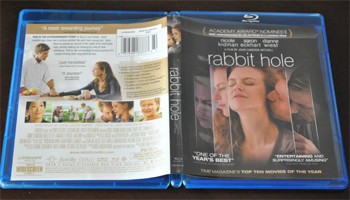 | 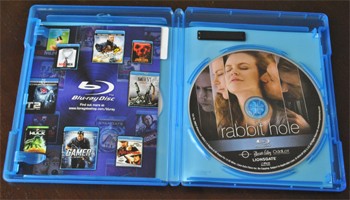 |
Video and Audio:
Rabbit Hole, shot digitally via the Red One camera system in high-definition, arrives from Lionsgate in a 1.78:1 1080p AVC encode that's damn near flawless. The positive merits of this Blu-ray disc could go on and on, from the precision in the concentration on fabric and rich skin textures to the sublime use of color in wood grains set design, and it handles fluctuations and minute details with a thorough eye for razor-sharp acuity. Contrast appropriately leaves detail visible in darker quadrants of the screen and within clothing and shadows, such as against Howie's dark polo shirt in the gym and in the darker parts of the skee-ball arcade, while the gradient shifts in lighter sequences -- the crisping creme brulee, the sheen on the floor in the bowling alley, and the gentle differentiation of marker strokes and pencil sketches -- contrast against one another with nary an instance of egregious bleeding or macro issues. If anything, there's a mild amount of smoothness that occurs due to the style of camera used, but you're really in for a treat with Lionsgate's presentation of Frank G. DeMarco's cinematography. It's beautiful.
The English DTS HD Master Audio track doesn't strike quite the same impressive chord as the visual transfer, but the sublime acoustic music and vocal delivery still shines. A few instances of surround activity stretch the design's legs out a bit, such as the chatter and pin-falling at a bowling alley, but mostly the rear channels are responsible for keeping the music as enveloping as possible. Verbal clarity hits a broad, fluid range of highs and low that depend on the vocals, with Eckhart's lower-toned voice hitting the bass depths and Dianne Wiest's higher-pitched voice stirring in the higher quadrant with robust clarity. The barking of a dog at a distance and the clank of skee-balls show discernment with spatial awareness, while the monotonous sounds of Becca working in the kitchen hold a well-balanced rhythm of ambiance. It's in the music, as previously stated, that the track really stands out, with piano notes ringing true amid silence and the incorporation of slight bass and strings slipping in with velvety poise. Both English and English SDH texts can be found alongside the Spanish language options under the subtitle menu, while a French 5.1 Dolby Digital track can also be paired with the film.
Special Features:
Filmmaker Commentary:
Director John Cameron Mitchell, writer David Lindsay-Abaire, and cinematographer Frank G. DeMarco gather together for this audio track, which follows an enriching and relaxed rhythm. They discuss the origin of the script, the reliance on Kidman and Eckhart's talent to create their chemistry under a very small amount of available rehearsal time, the updating of Howie's video from a VHS tape to the phone format, . Thay talk about Becca's maternal side and whether losing her child caused her to uptick her domestic exertion, the addition of scenes that weren't in the play, how Kidman signed onto the play, and the thought behind creating the artwork featured in the film (and the graphic artist who "got into character" while creating it). It's very low-key but offers a few unique shots of interesting content that keeps it upbeat, coasting all the way through the earnest, heartfelt back-slapping at the end.
Alongside the commentary, a trio of rather strong (but ultimately inessential) Deleted Scenes (3:07, HD AVC), and a terrific Theatrical Trailer (2:32, HD AVC).
Final Thoughts:
Rabbit Hole approaches a challenging topic -- the aftermath of losing a child -- and strikes a beautiful balance between drama and melodrama that's much more approachable and delightful to watch than many might expect from this type of material. Nicole Kidman and Aaron Eckhart are crucial to the film's strength, as they both deliver superb performances as the grieving couple, yet the absorbing cinematography and, of course, a richly-written script construct a tremendous infrastructure for their dramatic poignancy. John Cameron Mitchell exercises an impressive level of control over the drama, showing restraint and force in all the right moments, coming together into an immensely complete, self-aware portrait of grief that only pulls heartstrings where needed. It's one of 2010's woefully overlooked pictures that deserves to be seen. Lionsgate's Blu-ray looks and sounds tremendous, while containing a nice commentary with the filmmakers and a few deleted scenes. Highly Recommended.
|
| Popular Reviews |
| Sponsored Links |
|
|
| Sponsored Links |
|
|
| Release List | Reviews | Shop | Newsletter | Forum | DVD Giveaways | Blu-Ray | Advertise |
|
Copyright 2024 DVDTalk.com All Rights Reserved. Legal Info, Privacy Policy, Terms of Use,
Manage Preferences,
Your Privacy Choices | |||||||









